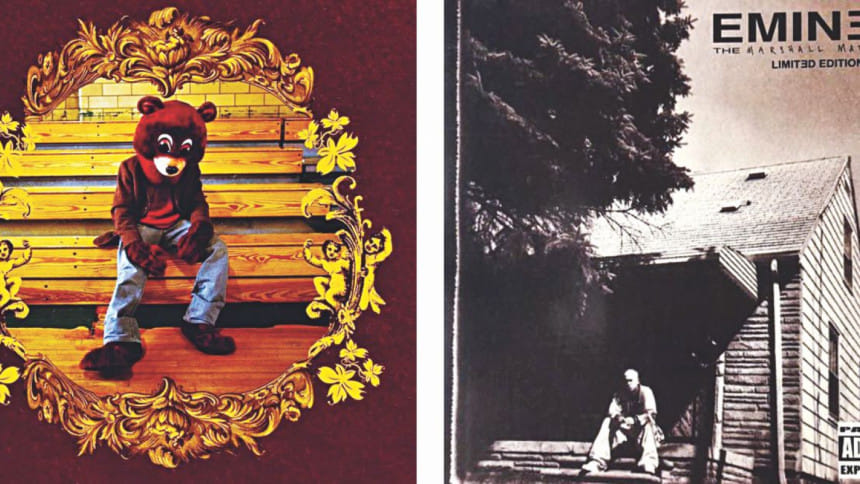The Evolution of Hip Hop

"Wherever I go, I bring the culture with me, so that they can understand that it's attainable. I didn't do it any other way than through hip hop." – Jay-Z
Culture, that's what hip hop is said to be ingrained with. One of the few genres of music to have originated from cultural backgrounds, hip hop became a medium for young African-Americans to have their voices heard since its inception in the 70s. Since then however, hip hop has changed greatly, transforming from an era of lyrical mastery, during the reign of Tupac and The Notorious B.I.G., to the current era of mumble rap featuring the likes of Lil Pump and Migos.
While for many devout fans of the genre these last few years have been disappointing, this overall transition in hip hop transpired during the 2000s. In order for us to really analyse the evolution of the genre, we really have to look at some of the most influential albums of these past two decades. And where better to begin, than with Eminem's hit record The Marshall Mathers LP.
Released in 2000, it is considered to this day to be one of hip hop's greatest albums. But what really makes it great? The album showcases common themes that most generations at that time could relate to, such as being broke, working subpar jobs and being bullied. It is Eminem's comedic approach to these issues, however, that makes the album a great listen. Eminem's lyrical ability is complemented well by Dr. Dre's production, resulting in the album being an absolute masterpiece. The skits placed in between the tracks are also highly entertaining and was an example of just how innovative a hip hop album could be.
The following year, the world would be exposed to Jay-Z's Blueprint, another monumental album, as it popularised the concept of "diss tracks". With the song Takeover, he lashes out at his haters while also providing a track that would make even the most reluctant of heads bob. Jay-Z also talks about the corruption within the music industry by white collar management who didn't have any understanding of the music they were releasing and were so disconnected they ignored real talent at times.
Following this, the only notable album that comes to mind is 50 Cent's Get Rich or Die Trying (GRDT) in 2003, while the album had some great hits, the lasting effects of it would not be as apparent as that of the two albums previously mentioned, both of which immediately began inspiring upcoming artists in the industry. GRDT left the hip hop community with a few hits that graced the parties for a while, but it wouldn't be long till 50 Cent would fade out of relevancy. Also around this time, Lil Wayne slowly started building his tumultuous career which would have its own impact on the scene.
However, an artist left inspired by all of this, was Kanye West. Kanye had already made his name as a producer, but labels had refused to sign him as an artist due to his lacking the persona of a rapper. Having produced most of Jay-Z's Blueprint, Kanye used his position as a producer to leverage a record deal.
What would follow would be album after album of Kanye's brilliance. The release of The College Dropout in 2004, showcased Kanye's talent as a rapper. Mixed with his already deft hand at producing, his lyrical abilities, finally having a stage to showcase itself, came into full gear. Kanye took the impactful lyricism of Jay-Z and the comedic humour of Eminem, and layered it into his album. He had skits playing almost after each track, but all of it came together meaningfully.
The rest of the decade would be dominated by Kanye, with his albums Graduation (2007) and 808s and Heartbreak (2008).
While Graduation was a bigger hit on release, 808s and Heartbreak left a more lasting impact on the hip hop community. The introduction of more trap style beats was heavily criticised upon the album's release in 2008, but looking back on it now, that was the moment that inspired a future generation of Drake, Fetty Wap and Migos to come forth.
Kanye himself would continue to explore new ideas with each consecutive album, as can be seen on My Beautiful Dark Twisted Fantasy, Yeezus and The Life of Pablo, but his greatest impact has been in subconsciously influencing the entire genre towards a more mainstream style.
808s and Heartbreak made a whole generation of artists realise trap drums and 808s would be the thing of the future. While we like to think of Kanye as a crazy narcissist, who lives in his own little world; using any form of controversy possible to promote himself and his music, the genius of Kanye lies within that fact that he ended up influencing all of these young artists who are now becoming relevant and who he can collaborate with to further his level of fame and influence.
A lot of hip hop's most religious fans often point out that hip hop has been dead during this decade. Lyrical ability is a thing of the past, and catchy meaningless and mumbled lyrics are what sell records. And while I'll agree, that mainstream hip hop is not what it was; I cannot help but point my finger to one individual in particular.
Enter Kendrick Lamar.
Kendrick had been on the rise for almost as long as Kanye had been branching out into this new style of hip hop. With his albums Section 80 (2011) and Good Kid, M.A.A.D City (2012), Kendrick showcased what can only be termed as his own personal style of hip hop. However, unlike Kanye, instead of adding in more pop elements, Kendrick went a more traditional route, sampling jazz and psychedelic music into his work.
The release of his 2015 masterpiece To P*** a Butterfly is probably one of the greatest examples of innovation within hip hop. Kendrick brings verses of poetry in between each track, talking about the theme of each song, with the big reveal at the end being that Kendrick has been reciting the poem to Tupac. And using samples from a Tupac interview, Kendrick continues to question him about politics, fame, hip hop and the music industry.
Even though Kanye is the polar opposite of Kendrick, both are essential pieces to the puzzle that is hip hop in the present. Both artists have showcased their ability to change hip hop from being influenced by the culture, to influencing the culture itself; and there is no doubt, they will continue to carry the torch for hip hop into the near future.
Aaqib loves petting doggos. Send him pictures of your "good boys" at [email protected]

 For all latest news, follow The Daily Star's Google News channel.
For all latest news, follow The Daily Star's Google News channel. 



Comments